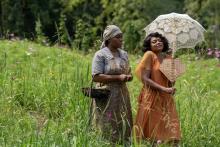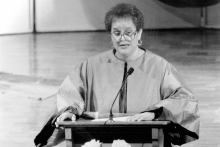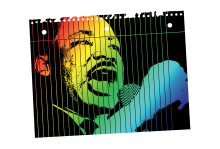alice walker

In her support of Icke and Rowling, Walker seems to have lost sight of her own claims about God and humanity that are revealed in The Color Purple and other works.

“You’ve never heard of womanist theology?!” My colleague Rev. Moya Harris looked at me with a mix of excitement and incredulity. This wasn’t unusual: Through I attended parochial schools and Catholic colleges, I’m a relative newbie to the wider world of faith-based organizations and advocacy — and thus my work frequently involves googling the names of theologians, denominations, and Christian leaders I’ve never heard of before. I love this environment of continued learning, but when I learned about womanist theology, I realized I had been missing a key element of my faith: the liberatory and healing nature of God.

Delores S. Williams, a trailblazer and founder of womanist theology, died on Nov. 18. She was the author of Sisters in the Wilderness: The Challenge of Womanist God-Talk and a professor of theology.

THIS SPRING, MY mother and I did something we have not done together since I was in junior high school: a creative, collaborative liturgical project. Starting when I was about 4 years old, my mother and I would make Christmas cards each year to give to our family and friends. She provided the text, usually in the form of her own biblically and seasonally inspired poetry, and I, an avid drawer, would illustrate her words. We continued this tradition for more than 10 years.
When the church I now attend invited contributions for a crowd-sourced congregational Lenten devotional booklet this year, my mother came up with an idea. She was, as she wrote, “A mom inspired by a thought—as Paul wrote letters to his beloved children and friends in faith ... so could I write a letter to my daughter.” Following the model of the Pauline epistles, my mom wrote me a letter of spiritual encouragement and advice on navigating wilderness, a key feature of both Lent and life. I decided to respond and thank her with a letter of my own. Together, the individual expressions of our relationship became a communal project.
In contemplating our project, I see a creation whose significance is more than the sum of its parts, so to speak. The joint submission of correspondence between my mother and me is not simply a nostalgic return to a lapsed family tradition. Rather, it is a reflection of a profound theological aspect of our relationship: the cultivation of selves in the space of love.

EARLIER THIS YEAR, I almost did not finish writing the sermon I was scheduled to preach at a special Martin Luther King Jr. Day Social Justice Shabbat service. Usually, I am able to bring sermons to a close without problem; this time, I struggled. Really struggled. Instead of focusing thematically on racism, poverty, war, or any number of issues King spoke out against, I had decided to preach on fear. I felt called to name fear as the root issue beneath so many others, something we struggle with individually and collectively. Fear of scarcity, fear of the unknown, fear of the “other”: the immigrant, the unarmed black person, the queer, the Sikh, the Muslim, the Jew, or the white person now encountering you in your queer, black, immigrant, brown, Muslim, Sikh, or Jewish body.
I found that once I started being honest about the fears we hold and the fears we face, I could barely turn the corner, in a manner of speaking, toward hope.
Eventually, I was able to theologically pivot my sermon and conclude positively. However, that experience of being spiritually stumped with writer’s block said more to me than any happy ending ever will. Rather than yielding answers, my sermon gave me questions, which continue to resonate in the midst of a global pandemic.
Sunday afternoon in Lower Manhattan, I ran into Salman Rushdie, who was walking nonchalantly through Zuccotti Park with his son. The renowned author's presence went largely unnoticed by the thousands of protesters, media and tourists crowding the park observing the Occupation demonstration.
On his way out of the park, Rushdie graciously took a few moments to talk with me about what he'd just witnessed. It was his first visit to the demonstrations and he was clearly moved by what he saw.